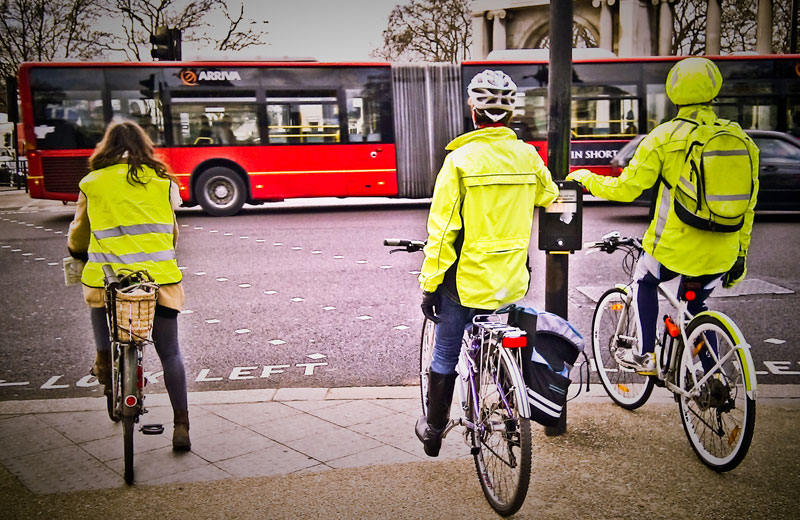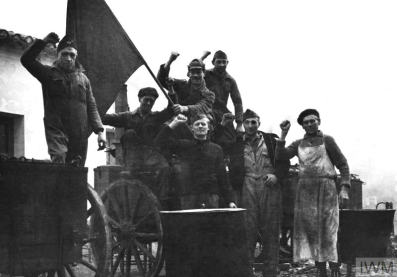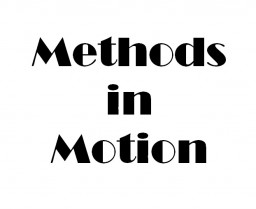 Cyclists in London
Cyclists in London
From an uncritical understanding of methodology, methods are the postscript to the real topic. They exist to produce data for testing theories, and their use is determined by the theoretical question. However, it is arguable that treating method as a technical afterthought downplays the extent to which social and intellectual change might be conveyed through method. Following this, much of my work involves trying to work with the intellectual and motivational benefits of a more active engagement with methodological issues and techniques. I do this because I feel that methodology often provides un-paralleled opportunities to think through the claims about the world that theories represent.
In many traditional definitions of the research process, first you define the question. Then you define the data that would allow that question to be answered. Finally you select and carry out the technical method most suited to creating that data. However, this model of research is arguably a mirage that ignores how many researchers actually work. Indeed, for many researchers who are engaged with and motivated by contemporary society, their questions are often produced by formal or informal on-the-ground experimental research. In other words, a research question is often the midpoint – a formalised statement of a personal, nagging feeling that there is something missing from the academic literature. In turn, the practical, intuitive sense that something is missing often comes from finding that conclusions in the literature do not resonate with their previous personal experience of either that situation, or a deep expertise of handling comparable data.
To take a personal example from my own research, I decided to investigate the contemporary growth of cycling in London because I wanted to know how different ways of moving around a city could change how people understood it. In particular, I wanted to explore how people could pass through identical locations whilst understanding them in completely different ways.
Methodologically, my research questions were established as I gained a better understanding of what methods were available for investigating the topic, and how they could be practically applied to the empirical conditions. For example, some previous researchers have conducted interviews whilst they and the interviewee were both cycling. In London’s traffic this side-by-side riding isn’t usually an option, so I had to experiment with different technical methods. I looked into different ways of interviewing people afterwards – videoing their ride, collecting and talking about travel diaries, or asking people to respond to videos of other people cycling. When I started experimenting with the methods I didn’t quite know what the combination of bikes, videos and language would create. I didn’t use the video to re-create a first-hand experience of cycling, nor did I expect that talk can unproblematically convey experience – but this wasn’t a limitation. In fact, it was my practical attempts to reflect and work out what my methods were actually capturing that prompted many of my insights into what cycling was. For example, it was my annoyance that many of the most interesting things were happening off-screen that made me realise how much of cycling is about peripheral vision and hearing, rather than the landscape ahead.
Spending large amounts of time thinking through, with and about my methods pushed me towards creating research questions that flow from interviews, videos and diaries. The overarching, slightly incoherent cloud of things I was interested in – cycling, London, geography – slowly condensed to a web of connected theories, datasets and experiences, with methodology becoming the way that I move between them in a structured manner. Focusing on the process of applying the methodology required me to really think about whether the assumptions in the literature make any sense in the practical situation - and if not, why not? Of course, such an iterative process of building theoretical, empirical and methodological expertise is not the only way to build a research project. Certainly, from the perspective of managing my limited time, it easily leaves too many questions open for too long, and easily becomes distracted. However, for me, methodological openness is how I base my findings in a practical understanding of the conditions within which they hold true. By experimenting with new techniques, researchers do not only gain access to additional areas of knowledge, they also gain exposure to alternative ways of thinking about society.
The Methods in Motion blogs are by researchers linked to the Centre for Citizenship, Identities and Governance. The blogs represent their opinions emerging from research in progress, and do not necessarily represent the views of the Research Centre or Open University. You can discover more about Methods in Motion on the CCIG website.






Rate and Review
Rate this article
Review this article
Log into OpenLearn to leave reviews and join in the conversation.
Article reviews